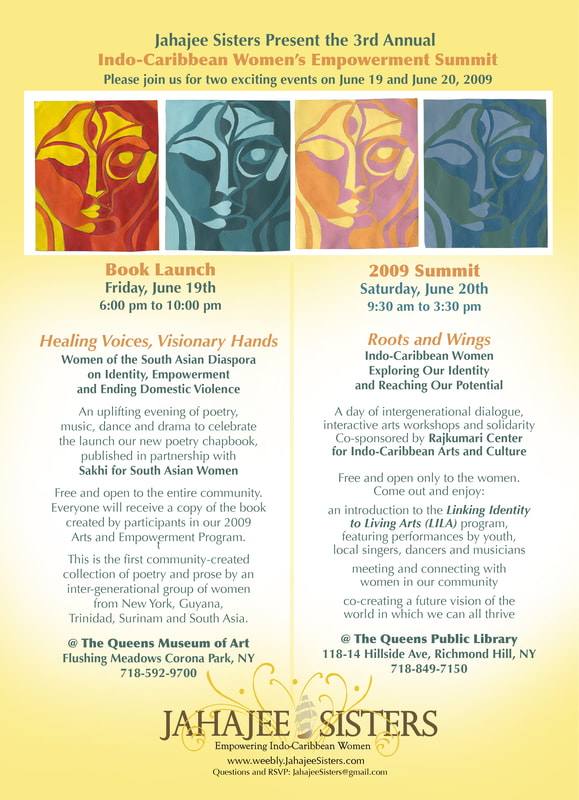Book Launch & 2009 Indo-Caribbean Women's Empowerment Summit

Bolo Bahen! Speak Sister! by Shabana Sharif
(Printed in Caribbean Life New York, July 2009)
What is jahajee? For some, the term is one of endearment. To most, however, it is a foreign word with no significance. An event celebrating Jahajee Sisters’ first book of poetry, Bolo Bahen! Speak Sister!, impressed upon attendees the idea that jahajee is synonymous with solidarity. The evening opened with Taij Kumarie Moteelall explaining the term. She told us that jahajee bhai and jahajee bahen literally mean “ship brother” and “ship sister,” and were popular phrases during the indentureship of Indians in the Caribbean (1838-1919), after they were uprooted from their ancestral land of pre-partitioned India. Laborers bonded in struggle and created family connections with one another regardless of religion, caste or mother tongue. Formerly the Indo-Caribbean Women’s Empowerment Group, Jahajee Sisters changed their name to pay homage to the strength and solidarity of the women that came before them.
During the book launch event on Friday, June 19th at the Queens Museum of Art, in Queens, New York, women performed pieces from Bolo Bahen! Speak Sister! through their voices, movements and emotions. The twelve Indo-Caribbean women ranged in age from about 16 to 60 and originated from various regions of the Indo-Caribbean Diaspora—Guyana, Jamaica, Suriname, Trinidad, and the United States. The women shared their stories with eager listeners, who were visibly intrigued by the poetry and artistic talent on stage.
The Queens Museum of Art was filled with community locals of every denomination, passionately taking the women’s words into their ears, minds and hearts. The women took the stage ready to be heard and seen in alluringly vivid shalwars, bold faced, and standing in strength. This being the organization’s first formal performance, audience members were unsure of what would unfold. And as the pieces and performances began and concluded, everyone in the space became jahajee brothers and sisters. Artists continually transformed the stage from performance to performance, all vastly different yet centering on themes of empowerment, perseverance and humanity. The poems were performed in a variety of formats including music, song, movement, mother and daughter collaboration, and group collaborations.
The performances began with a collective piece by several members of Jahajee Sisters’ Advisory Committee. The performers traveled through India, Guyana and the United States, taking all audience members on their jahajee journeys. Attendees began in India searching for a loved one. In the last journey, a sister in the United States celebrated her multi-faceted identity while questioning her ancestral historical past. Further into the program, Indo-Guyanese singer Indra Seet and Indo-Trinidadian singer Rhia Ramdeen Ramoutar (who both contributed to the anthology) sang bhajans, filmi songs, and folk songs interwoven with spoken word. The singers collaborated on the poem “Picking up the Pieces,” singing as mother and daughter. Simone Jhingoor’s poem, “Miseducation of Me,” melded together 2 musicians, guitarist Eddie Arjun Peters and singer Ella Turenne. The seamless transitions between artist to artist catapulted audience members’ attention as guitarist, singer and poet wailed their sorrows of love.
The last performance centered on domestic violence and its effects on victims and survivors. The women banded together as “Warrior Women” who refused to be victims, oppressed and dehumanized. Shivana Jorawar, Jacqueline R. Latif-Scully, Taij Kumarie Moteelall, and Kavita Ramdeen transcended the stage to a battle ground. On their land they bonded together to reject misused patriarchal power. Shivana Jorawar and Kavita Ramdeen moved their words into movement in the waged war against injustice. Using their movements and their voices as their tools, Shivana and Kavita raised their fists, arms, and heads high as they spun us all into non-violent warriors.
Attendees’ feedback at the end of the performance hailed an overwhelming approval of—yes! The closing act for the evening opened the pathway for audience dialogue. Male and female audience members expressed their support of and belief in Jahajee Sisters’ work. An Indo-Caribbean brother spoke of his support and announced he was a feminist. A woman stood up and shared “I have never done this before in public, I am a survivor [of domestic violence]!” As she sat down, the room congratulated her with applause and cheers. Participants immediately inquired about volunteering opportunities, proposed Jahajee Sisters continue performing and take their performance “on the road,” and expressed interest in the organization’s next steps. Jahajee Sisters set a tone that evening: through empowerment we can progress with unity and togetherness.
The creation of the book began with Jahajee Sisters’ Arts & Empowerment series, organized in partnership with Sakhi for South Asian Women. From January to April 2009, Jahajee Sisters hosted 10 workshops for 15 to 20 women, who brought their voices, stories and thoughts together to ultimately create Bolo Bahen! Speak Sister! The book marks the first anthology written by Indian women from the Caribbean, South Asia and the United States. Using art as a tool for activism, the Arts & Empowerment program gave women an opportunity to assemble in a safe space and feel solidarity based on identity and their belief in women’s empowerment. Writers of all backgrounds, experiences, and demographics shared their narratives for the creation of the book.
Jahajee Sisters Advisory Committee members Simone Devi Jhingoor, Shivana Jorawar, Vijai Kublall, Jacqueline R. Latif-Scully, Taij Kumarie Moteelall, Suzanne Persard, Shabana Sharif, and Pritha Singh, along with Malcolm Hall, Manauvaskar Kublall, and Shaun Singh meticulously crafted the free book launch event, and the collective performance. Their dedication and devotion to the work of empowering women was clearly visible and appreciated by all who attended.

